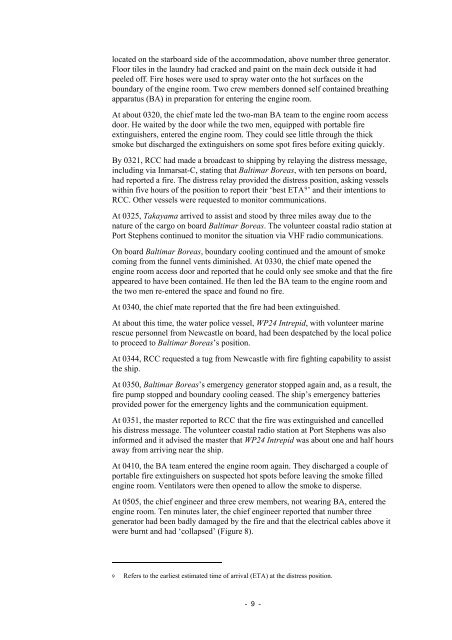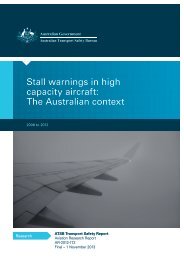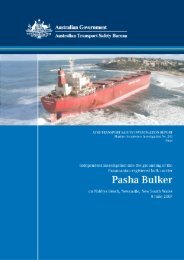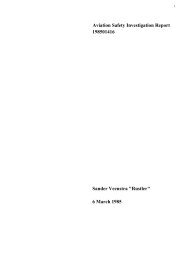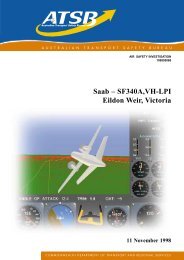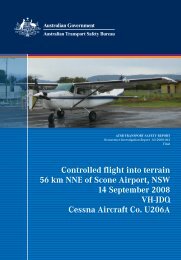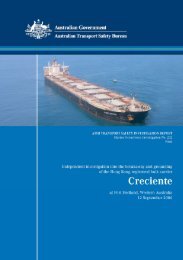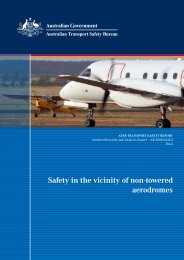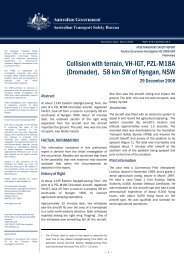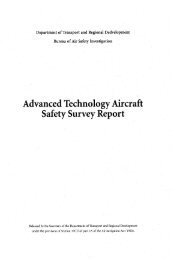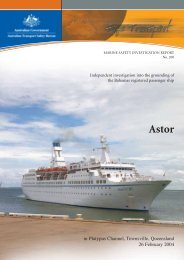Marine Report 236, Independent investigation into the engine room ...
Marine Report 236, Independent investigation into the engine room ...
Marine Report 236, Independent investigation into the engine room ...
Create successful ePaper yourself
Turn your PDF publications into a flip-book with our unique Google optimized e-Paper software.
located on <strong>the</strong> starboard side of <strong>the</strong> accommodation, above number three generator.<br />
Floor tiles in <strong>the</strong> laundry had cracked and paint on <strong>the</strong> main deck outside it had<br />
peeled off. Fire hoses were used to spray water onto <strong>the</strong> hot surfaces on <strong>the</strong><br />
boundary of <strong>the</strong> <strong>engine</strong> <strong>room</strong>. Two crew members donned self contained breathing<br />
apparatus (BA) in preparation for entering <strong>the</strong> <strong>engine</strong> <strong>room</strong>.<br />
At about 0320, <strong>the</strong> chief mate led <strong>the</strong> two-man BA team to <strong>the</strong> <strong>engine</strong> <strong>room</strong> access<br />
door. He waited by <strong>the</strong> door while <strong>the</strong> two men, equipped with portable fire<br />
extinguishers, entered <strong>the</strong> <strong>engine</strong> <strong>room</strong>. They could see little through <strong>the</strong> thick<br />
smoke but discharged <strong>the</strong> extinguishers on some spot fires before exiting quickly.<br />
By 0321, RCC had made a broadcast to shipping by relaying <strong>the</strong> distress message,<br />
including via Inmarsat-C, stating that Baltimar Boreas, with ten persons on board,<br />
had reported a fire. The distress relay provided <strong>the</strong> distress position, asking vessels<br />
within five hours of <strong>the</strong> position to report <strong>the</strong>ir ‘best ETA 9 ’ and <strong>the</strong>ir intentions to<br />
RCC. O<strong>the</strong>r vessels were requested to monitor communications.<br />
At 0325, Takayama arrived to assist and stood by three miles away due to <strong>the</strong><br />
nature of <strong>the</strong> cargo on board Baltimar Boreas. The volunteer coastal radio station at<br />
Port Stephens continued to monitor <strong>the</strong> situation via VHF radio communications.<br />
On board Baltimar Boreas, boundary cooling continued and <strong>the</strong> amount of smoke<br />
coming from <strong>the</strong> funnel vents diminished. At 0330, <strong>the</strong> chief mate opened <strong>the</strong><br />
<strong>engine</strong> <strong>room</strong> access door and reported that he could only see smoke and that <strong>the</strong> fire<br />
appeared to have been contained. He <strong>the</strong>n led <strong>the</strong> BA team to <strong>the</strong> <strong>engine</strong> <strong>room</strong> and<br />
<strong>the</strong> two men re-entered <strong>the</strong> space and found no fire.<br />
At 0340, <strong>the</strong> chief mate reported that <strong>the</strong> fire had been extinguished.<br />
At about this time, <strong>the</strong> water police vessel, WP24 Intrepid, with volunteer marine<br />
rescue personnel from Newcastle on board, had been despatched by <strong>the</strong> local police<br />
to proceed to Baltimar Boreas’s position.<br />
At 0344, RCC requested a tug from Newcastle with fire fighting capability to assist<br />
<strong>the</strong> ship.<br />
At 0350, Baltimar Boreas’s emergency generator stopped again and, as a result, <strong>the</strong><br />
fire pump stopped and boundary cooling ceased. The ship’s emergency batteries<br />
provided power for <strong>the</strong> emergency lights and <strong>the</strong> communication equipment.<br />
At 0351, <strong>the</strong> master reported to RCC that <strong>the</strong> fire was extinguished and cancelled<br />
his distress message. The volunteer coastal radio station at Port Stephens was also<br />
informed and it advised <strong>the</strong> master that WP24 Intrepid was about one and half hours<br />
away from arriving near <strong>the</strong> ship.<br />
At 0410, <strong>the</strong> BA team entered <strong>the</strong> <strong>engine</strong> <strong>room</strong> again. They discharged a couple of<br />
portable fire extinguishers on suspected hot spots before leaving <strong>the</strong> smoke filled<br />
<strong>engine</strong> <strong>room</strong>. Ventilators were <strong>the</strong>n opened to allow <strong>the</strong> smoke to disperse.<br />
At 0505, <strong>the</strong> chief <strong>engine</strong>er and three crew members, not wearing BA, entered <strong>the</strong><br />
<strong>engine</strong> <strong>room</strong>. Ten minutes later, <strong>the</strong> chief <strong>engine</strong>er reported that number three<br />
generator had been badly damaged by <strong>the</strong> fire and that <strong>the</strong> electrical cables above it<br />
were burnt and had ‘collapsed’ (Figure 8).<br />
9 Refers to <strong>the</strong> earliest estimated time of arrival (ETA) at <strong>the</strong> distress position.<br />
- 9 -


